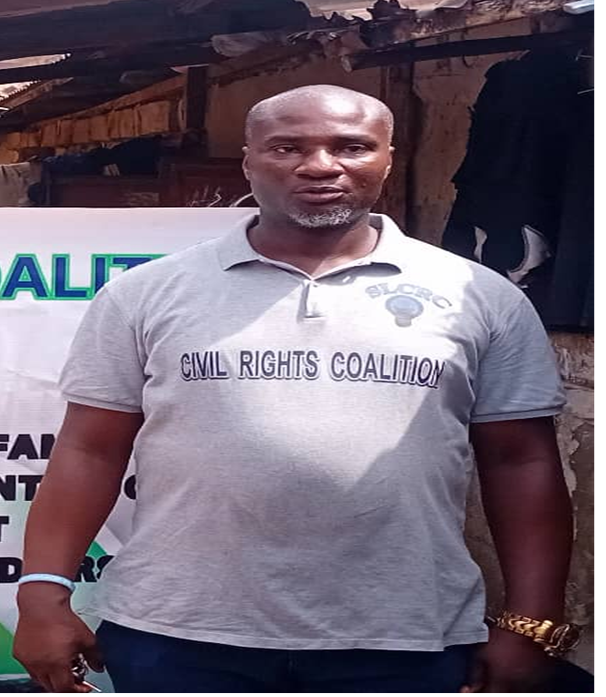By Marcus Bangura
The Sierra Leone Civil Rights Coalition (CRS), in collaboration with the Ministry of Basic and Senior Secondary Education (MBSS), has launched a nationwide sensitization and public awareness campaign to emphasize the importance of the Continuous Assessment Scores (CAS) and Best Result Scores (BRS) registration process, ensuring widespread understanding to avert the risk of potential candidates being denied access to their exams.
Led by National Coordinator Alphonso Manley, the campaign aims to highlight the importance of timely registration, ensuring that WASSCE, BECE, and NPSE candidates can access their exams without hindrance—a challenge that has affected students for the past two years. Manley emphasized that the campaign is designed to ensure widespread understanding of CAS and BRS, which are vital for students’ participation in national exams like the WASSCE.
The campaign was officially launched on Tuesday, 25th February, 2025, at Congo Market in Freetown, with key stakeholders making statements. Prominent among them were representatives from the Ministry of Basic Education, WAEC, the Council of Principals, and traditional authorities, all in the presence of the media. Following the launch, the team visited various markets across Freetown to directly engage parents and guardians, ensuring they understand the registration process and deadlines. This initiative aims to educate families, schools, and communities about the importance of timely CAS registration, ensuring students are eligible for national exams, particularly the WASSCE.
In an interview with journalists, Manley emphasized that the coalition is fully backing the Ministry of Basic Education’s policy by working to inform the public about recent updates and guidelines regarding government educational reforms. “Our goal is to ensure that families and communities are well-informed about their responsibilities. It is essential that they check with school authorities to confirm whether CAS (1) has been uploaded for their children who will be taking the WASSCE. Without uploading CAS (1) into the WAEC portal and generating the corresponding reference number, students will not be able to sit for their WASSCE exams,” he explained.
Manley also took the opportunity to remind families and communities of the deadline for CAS registration for the Basic Education Certificate Examination (BECE) and National Primary School Examination (NPSE) by Thursday, February 27th. He urged Schools to complete their uploads to the WAEC portal before or by the deadline day, otherwise, their children would not be eligible for the exams.
He noted that this process was previously paper-based but has now transitioned to a fully automated digital system, which aligns with the Ministry’s vision for modernization. “The recent theme for Education Week cantered around AI and Automation, reflecting the government’s push towards technological advancement in education,” Manley said.
This transition is not just about automation; it also aligns with the Ministry’s policies, particularly Section 31(2) of the Basic Education Act, which outlines the legal framework for digital advancements in the sector. This shift is in line with the broader national education plan, which seeks to integrate digital technologies into the education system to improve efficiency and accountability.
C4D Media holds the view that the Civil Rights Coalition’s campaign is a crucial step in addressing the importance of timely registration through the WAEC system. With the deadline passed for BECE and NPSE, we hope all schools have completed their uploads to the WAEC portal. The Coalition’s efforts are critical in ensuring that no student is left behind due to administrative challenges or delays in registration considering the length of time given to schools for CAS and BRS registration. By fostering strong community involvement and raising awareness, the campaign seeks to empower parents and guardians to actively participate in ensuring that their children’s educational records are complete and up-to-date, ultimately supporting their academic success.
But what is Continuous Assessment Scores and Best Result Scores System? In our research, we found that Continuous Assessment Scores (CAS) system evaluates students based on their ongoing performance in the classroom, such as tests, assignments, and projects, rather than relying solely on final exams. This assessment method aims to provide a more comprehensive evaluation of a student’s abilities over time. The Best Result Score (BRS) combines the highest scores from both CAS and final exams, offering a clearer picture of a student’s academic strengths. In other words, BRS is often used in the context of public exams to refer to the highest score a student achieves from their continuous assessment and final exams, with a focus on the best results.
By and large, it goes without saying that the WAEC CAS and BRS together give a more holistic picture of a student’s academic abilities, combining ongoing performance with end-of-year exam results.
It is imperative that timely registration guarantees exam participation, ensuring that exams are taken without last-minute complications; prevents educational disruption in that when students miss exams due to registration issues, it affects their academic progress and future opportunities; ensures accurate records since the CASS system helps WAEC maintain accurate candidate records, reducing errors and omissions and above all supports equal access by ensuring all students are registered in time to prevent exclusion due to administrative delays. It is on this basis and to prevent registration challenges that Alphonso Manley, the Executive Director of the Civil Rights Coalition, in collaboration with the Ministry of Basic and Senior Secondary Education, launched a nationwide public engagement campaign with the objective of specifically targets markets, women and parents to raise awareness about the importance of early exam registration. By prioritizing timely registration through the CASS system, we can prevent future exclusions and ensure that every eligible student has the opportunity to take their exams and progress academically.


